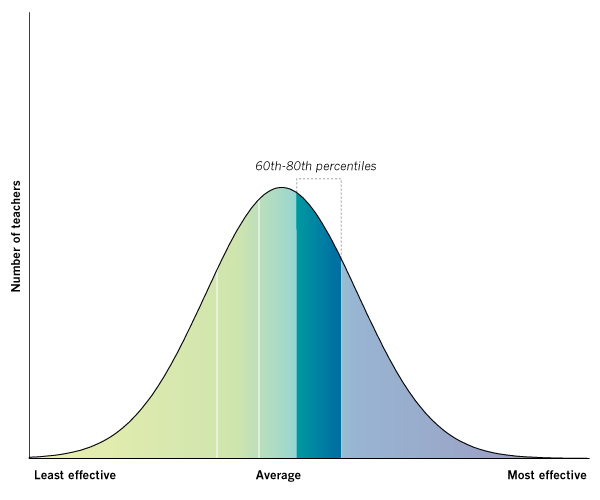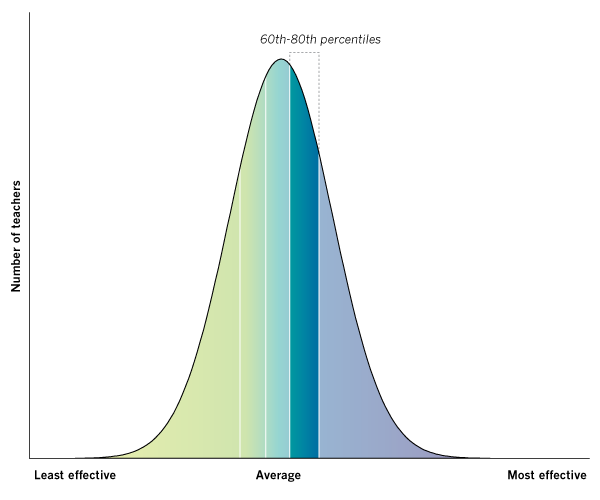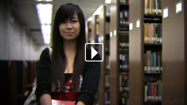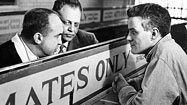Bonnie Brandin Boyle
A 4th grade teacher at Welby Way Elementary in 2009
These graphs show a teacher's "value-added" rating based on his or her students' progress on the California Standards Tests in math and English. The Times’ analysis used all valid student scores available for this teacher from the 2002-03 through 2008-09 academic years. The value-added scores reflect a teacher's effectiveness at raising standardized test scores and, as such, capture only one aspect of a teacher's work.
Compared with other Los Angeles Unified teachers on the value-added measure of test score improvement, Boyle ranked:
- More effective than average overall.
- More effective than average in math. Students of teachers in this category, on average, gained about 4 percentile points on the California Standards Test compared with other students at their grade level.
- More effective than average in English. Students of teachers in this category, on average, gained about 2 percentile points on the California Standards Test compared with other students at their grade level.
Boyle's LAUSD teaching history
2002-03 through 2008-09 academic years
- Welby Way Elementary, 2009 - 2003
Bonnie Boyle's Response:

While my rating is very positive, I am so disheartened that the LA Times has chosen to publish this information. I have taught at this school since 1996 (not 2004)at all different grade levels. 4th grade was a new curriculum for me, while the students were also in a new math program. Class sizes were increased and more than half of my class was identified gifted, thus narrowing the margin of growth.
Teachers have always been given this data and use it to drive instruction. We meet within grade levels and discuss programs and methods to improve scores and enhance the curriculum. Standardized tests should only be used for this purpose, not to judge the effectiveness of a teacher.
I know that I'm effective when my students become responsible for their own learning, are interested and motivated to learn more, and develop skills to become successful, productive citizens. I am effective when students learn to use critical thinking and higher level reasoning to solve problems. I am effective when students learn to work together in a group, treat others fairly, and can work to solve their own conflicts.
Other than English and math for one standardized test, the elementary teacher is responsible for science, social studies, art, music, composition, health, physical education, library & resource skills, computer skills, hand writing,organization, social skills, work and study habits, building self confidence and discipline.
Education involves the whole child. It is much more meaningful to experience, a student's excitement and discussion about reading than to read their scores for a multiple choice test. Listening to class discussions where they originate new ideas, reading their creative writing, sharing their interests in the arts, and observing their scientific skills is also much more meaningful.
The following is information from the National website Fairtest.org
"No test is good enough to serve as the sole or primary basis for important educational decisions. Teaching to the test also narrows the curriculum, forcing teachers and students to concentrate on memorization of isolated facts, instead of developing fundamental and higher order abilities. Tests that measure as little and as poorly as multiple-choice tests cannot provide genuine accountability. Pressure to teach to the test distorts and narrows education. Instead of being accountable to parents, community, teachers and students, schools become "accountable" to a completely unregulated testing industry.
Better methods of evaluating student needs and progress already exist. Good observational checklists used by trained teachers are more helpful than any test. Assessment based on student performance on real learning tasks is more useful and accurate for measuring achievement - and provides more information - than multiple-choice achievement tests.
The U.S. is the only economically advanced nation to rely heavily on multiple-choice tests. Other nations use performance-based assessment where students are evaluated on the basis of real work such as essays, projects and activities. Ironically, because these nations do not focus on teaching to multiple-choice tests, they even score higher than U.S. students on those kinds of tests."
I refuse to "teach to the test", because I care about the education of my students. By publishing this information, the LA Times will contribute to the downfall and current misunderstanding of these standardized tests and their importance to evaluations of teachers. Standardized tests do not add value.
![]() The Times gave LAUSD elementary school teachers rated in this database the opportunity to preview their value-added evaluations and publicly respond. Some issues raised by teachers may be addressed in the FAQ. Teachers who have not commented may do so by contacting The Times.
The Times gave LAUSD elementary school teachers rated in this database the opportunity to preview their value-added evaluations and publicly respond. Some issues raised by teachers may be addressed in the FAQ. Teachers who have not commented may do so by contacting The Times.
|
|
 Delicious
Delicious
|
 Digg
Digg
|
 Facebook
Facebook
|
 Twitter
Twitter
|









